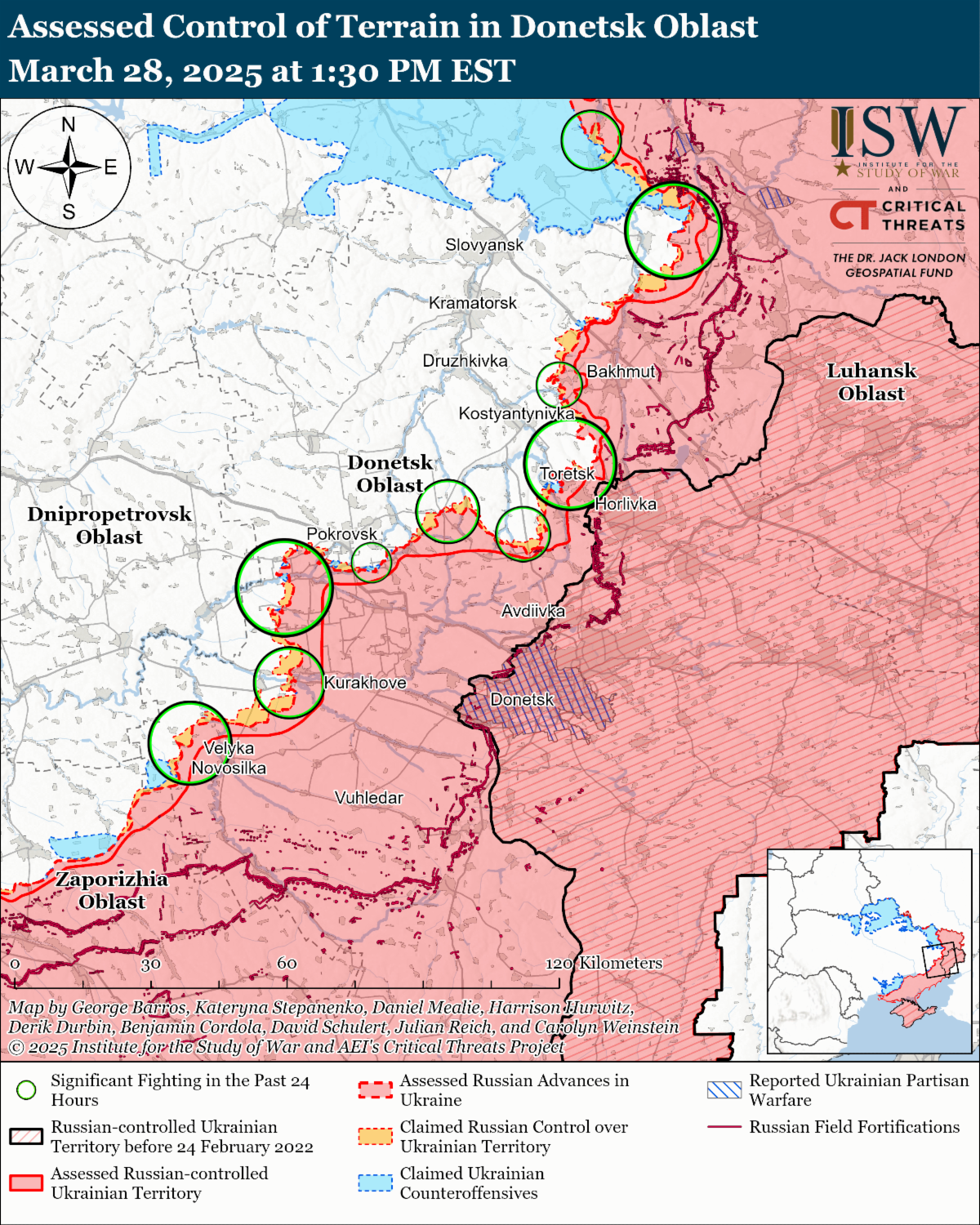Russian President Vladimir Putin is reintensifying efforts to portray the current Ukrainian government as illegitimate and unable to engage in negotiations to end the war in Ukraine. Putin reiterated longstanding boilerplate rhetoric during a visit to a Russian submarine command post in Murmansk Oblast on March 27, claiming that "Nazis" and people with "neo-Nazi views" have significant influence in the Ukrainian government and that "neo-Nazi groups" have the "actual power in their hands" in Ukraine. Putin reiterated claims that Ukrainian President Volodymyr Zelensky is illegitimate because Ukraine did not hold presidential elections in 2024 and additionally alleged that all Ukrainian civil authorities are therefore illegitimate since the president appoints regional officials. The Ukrainian Constitution explicitly prohibits elections during periods of martial law and invasion by a hostile country, however. Putin claimed that "neo-Nazi formations" are ruling Ukraine in the absence of a legitimate Ukrainian government and questioned how Russia can negotiate with these groups. Putin has previously characterized the Ukrainian government as illegitimate in an effort to justify Russia's unwillingness to engage in good faith negotiations to end the war and has consistently identified "denazification" – a phrase the Kremlin uses to make its demand for the removal of the Ukrainian government and the installation of a pro-Russian puppet regime – as a goal of his full-scale invasion since February 2022.
Putin repeatedly accused Zelensky of being the illegitimate leader of Ukraine ahead of Putin's February 12 phone call with US President Donald Trump, but has made these accusations much less frequently in recent weeks. Putin notably implicitly acknowledged Zelensky as the legitimate president of Ukraine and Russia's future negotiating partner for the first time in late February 2025, and Putin's March 27 statement appears to be a reintensification of his accusations designed to undermine Zelensky's legitimacy. ISW previously noted that the Kremlin's ongoing effort to characterize the Ukrainian government as an illegitimate negotiating partner casts serious doubt on the Kremlin's willingness to negotiate in good faith about a settlement of the war and sets informational conditions for Russia to violate any agreement reached on the grounds that the Ukrainian government had no legal right to conclude it.
Putin reiterated his demand for the elimination of the "root causes" of the war in Ukraine as a precondition for a peace agreement – a reference to Russia’s initial war demands that directly contradict US, European, and Ukrainian efforts to achieve a just and sustainable resolution to the war. Putin claimed that Russia is committed to ending the war in Ukraine but only if a peace agreement addresses the "root causes" of the war. Senior Russian officials have repeatedly defined these root causes as NATO's alleged violation of obligations not to expand eastward and Ukraine's alleged violations of the rights of Russian-speaking minorities in Ukraine. The Kremlin's demands to address these so-called "root causes" amount to a demand for full Ukrainian capitulation with the installation of a pro-Russian government in Ukraine and commitments of Ukrainian neutrality – the same demands Putin has made since before the full-scale invasion.
Putin is attempting to inject a new demand aligned with the Kremlin's long-standing efforts to undermine the Ukrainian government's legitimacy into discussions about the resolution of the war. Putin proposed that the United Nations (UN), United States, and European countries install a temporary administration in Ukraine that would hold democratic elections to bring to power "a viable government that enjoys the people's trust." Putin claimed that a temporary Ukrainian government would allow Russia to "begin negotiations [with the new Ukrainian administration] on a peace treaty" and "sign legitimate documents that will be recognized throughout the world." White House National Security Council Spokesperson James Hewitt rightly dismissed Putin's proposal to impose a temporary administration over Ukraine, stating that the Ukrainian Constitution and the Ukrainian people determine Ukraine's governance. UN Secretary General Antonio Guterres also rejected Putin's proposal and stated that Ukraine has a legitimate government that must be respected.
Putin's new demand for an interim government in Ukraine as a precondition for peace negotiations demonstrates how the Kremlin continues to hold negotiations hostage and is attempting to extract additional concessions from the West following the progress made in the ongoing ceasefire negotiations. ISW continues to assess that the Kremlin remains committed to its goal to prolong any negotiations for a temporary frontline ceasefire or permanent peace agreement in order to continue making incremental gains on the battlefield and establish favorable conditions to pursue Ukraine's complete capitulation.
Key Takeaways:
- Russian President Vladimir Putin is reintensifying efforts to portray the current Ukrainian government as illegitimate and unable to engage in negotiations to end the war in Ukraine.
- Putin reiterated his demand for the elimination of the "root causes" of the war in Ukraine as a precondition for a peace agreement – a reference to Russia’s initial war demands that directly contradict US, European, and Ukrainian efforts to achieve a just and sustainable resolution to the war.
- Putin is attempting to inject a new demand aligned with the Kremlin's long-standing efforts to undermine the Ukrainian government's legitimacy into discussions about the resolution of the war.
- The Kremlin appears to be renewing efforts to reorganize Russia's five naval infantry brigades into divisions.
- Ukrainian forces recently advanced in Belgorod Oblast. Russian forces recently advanced in Kursk Oblast, near Toretsk and Kurakhove, and in western Zaporizhia Oblast.
- Russia plans to expand its nuclear submarine fleet.
| 



